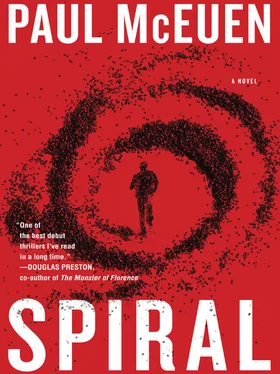A team of weapons experts and forensic materials scientists had already poked and prodded the cylinder every way they could. It had identical dimensions to the ones that had been recovered from the Japanese submarines. Something slid around inside when you tilted it, like a marble. They couldn’t do an MRI because the metal shielded out the radio waves. X rays didn’t show anything. A quick and ferocious debate followed about what to do, but in the end they’d simply decided to open the damn thing, and Toloff got the task. On the video, Dunne saw her hand shaking and the rivulets of sweat on her face as she twisted open the cylinder. The camera zoomed in on her gloved hands. “It’s resisting,” she said. Her hand jerked slightly. “All right,” she said. “The threads are sliding past one another. Here we go.”
Dunne braced himself as if he were in the room with her. The cylinder might be booby-trapped. They’d checked the mass against the thickness of the walls, which they had evaluated with ultrasound. It could be an explosive.
She unscrewed the cylinder, then carefully set the upper section on the table. She looked inside the other half.
“Holy crap,” she said. She studied it for a few seconds, then looked up at the camera. “You’re not going to believe this.”
She laid a Texwipe on the table, gently shook the cylinder over it to disgorge the contents.
You’ve got to be kidding , Dunne said to himself.
It was a bone. A human finger bone. The significance of the finger bone was not lost on Dunne. She had probably taken it from the finger she cut off of the man in Times Square.
Toloff said, “There’s writing on it. Zoom in.”
Etched in letters so small that they were barely readable was a message.
KITANO MUST PAY 
Dunne recognized the Chinese characters at the end of the message. They were the characters for Orchid .
 29
29 
SHE DID EVERYTHING RIGHT. ORCHID MADE JAKE TAPE HIS own mouth closed, then put him in the lead, where he could see nothing but the way ahead. She directed him out the back door, a path that would take them nowhere near the gun he’d tossed aside. Her exit route was secure and hidden—through a stand of woods behind the herbarium. It was still light out, but the sun was low, the branches casting shadows that cut across the patches of snow like streaks of black paint.
They were hundreds of yards away from the nearest road. If anyone caught a glance from afar, they’d look like a group of hikers.
Maggie was behind him, holding Dylan close. Jake heard her crying. Orchid questioned her as they walked, asking where the Uzumaki was hidden. Maggie kept repeating, “I don’t know.”
Jake’s nerves were on high alert. He was thinking it through, and he didn’t like where his thoughts were leading. If Orchid was after the Uzumaki, Jake had to end this. No matter the cost.
Orchid spoke. “Up there,” she said. “To your left, twenty degrees.”
A white FedEx van was parked on the side of the road.
“The back door,” she said.
The door screeched as Jake opened it.
Maggie screamed, shielding Dylan from the grisly sight. A young woman was curled up on the floor of the van like a discarded doll. She’d been shot in the head. The bottom of the van was sticky red.
“Inside,” Orchid said. Jake obeyed, the smell of iron thick in his nostrils. He recognized her from the red curly hair. Cindy. Maggie’s roommate from Rivendell.
Orchid pointed toward the right wall. “Put that on.” A belt was hanging on the wall, thick and black with a plastic box on the back the size of a paperback book. Jake strapped it to his waist. He had a pretty good idea what it was for.
She tapped a sequence on her leg.
The belt on Jake’s waist hummed as fifty thousand volts shot up his spine. It knocked him to his knees, hands in fists, groaning. “That was a warning,” she said. “At full strength, it will kill you.” Orchid pointed to the woman on the floor. “Get her out. Put her in the woods. Make sure the body’s out of sight.”
Jake did as he was told, carrying Cindy’s lifeless body. He tried to block out the cold, clammy feel of her skin, the terrible whiteness of her arm. A memory hit him from the bulldozer assault, the Iraqi soldiers buried in the sand, cat shit in a litterbox. Afterward he’d seen a sunburned arm sticking out of the sand, clutching a boot. The poor bastard must’ve been asleep, then took off running, grabbing what he could.
Stop it . Jake focused on the situation, sorting it through, click, clack . Jake knew it, the soldier in him knew it. You do what you have to do. And what he had to do was stop this woman.
He laid Cindy down among the leaves. He looked around. He was far enough away. He could make a run for it, might make it or at least get noticed. The other side of the woods led to a major road. He glanced back toward the van. Dylan was crying, Maggie trying to console him. Orchid stood, watching Jake. She had the gun pointed at Maggie’s head. She spoke, just loud enough to be heard: “Let’s go.”
 30
30 
“HE’S BEEN SITTING LIKE THAT FOR ALMOST TWO HOURS,” said Stan Robbins, the man in charge of Kitano’s surveillance. Robbins and Dunne were in a secure National Security Council conference room in the Eisenhower Executive Office Building, the six-hundred-thousand-square-foot monstrosity across the street from the West Wing. On the screen before them was an overhead view of Hitoshi Kitano’s cell, a real-time feed from the surveillance cameras at the United States Penitentiary in Hazelton, West Virginia, a maximum-security facility.
DUNNE HAD FIRST MET HITOSHI KITANO MORE THAN TWO decades ago, when Dunne was still a relatively unknown professor at Yale. Dunne’s Ph.D. treatise, then still speculation, on the downfall of the Soviet Union and the subsequent rise of China had caught the old man’s attention. Kitano was by then one of the richest men in Japan. Their relationship had ended twenty-two months before, when, at eighty-three years old, Hitoshi Kitano had been imprisoned at Hazelton. The previous sixty years had been a circular journey for Kitano, starting and ending in an American jail. Dunne had insisted that the FBI closely monitor Kitano since his imprisonment. It had been a mess of paperwork, not to mention demanding the more or less full-time attention of Robbins. But the FBI had more than twelve thousand agents—they could spare one. Where Kitano and the Uzumaki were concerned, Dunne took no chances.
The camera shot of Kitano’s cell was from a light fixture in the ceiling. Kitano sat stock-still, staring into space. The time stamp said four-forty-one p.m. What the hell was wrong with him? Dunne wanted to crack open his skull and peer inside.
Dunne scanned the rest of the cell. On a small shelf on the wall were three books. “What’s he reading?”
“One’s a book on pigeon racing.”
“He’s a fanatic,” Dunne said. “Specializing in long-distance races. Two years ago, right before he was put in, one of his pigeons won the twelfth Sun City Million Dollar in South Africa, the most prestigious pigeon race in the world.”
“Good for him. Book number two: Institutions, Industrial Upgrading, and Economic Performance in Japan: The ‘Flying Geese’ Paradigm of Catch-up Growth by Terutomo Ozawa. I read it: the author advocates something called gankou keitai. ”
Читать дальше


 29
29 










